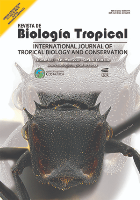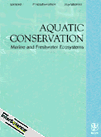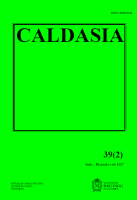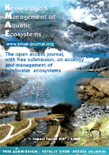
Tropical Life Sciences Research
Scope & Guideline
Empowering Knowledge in Tropical Ecosystems and Medicine
Introduction
Aims and Scopes
- Ecological Studies:
Research on the interactions within ecosystems, including studies on biodiversity, species distribution, and habitat conservation. - Biochemical and Molecular Research:
Investigations into biochemical processes and molecular mechanisms in plants and animals, including studies on bioactive compounds and genetic diversity. - Agricultural and Environmental Applications:
Research addressing agricultural practices, sustainable resource management, and environmental impacts, particularly in relation to tropical crops and ecosystems. - Conservation Biology:
Studies aimed at understanding species conservation, habitat restoration, and the impact of human activities on tropical biodiversity. - Marine and Aquatic Research:
Exploration of marine and freshwater ecosystems, focusing on species interactions, water quality, and the effects of pollution and climate change.
Trending and Emerging
- Climate Change Impact Studies:
Research examining the effects of climate change on tropical ecosystems and species is increasingly prominent, highlighting the urgent need to understand and mitigate these impacts. - Sustainable Agricultural Practices:
There is a growing emphasis on sustainable agriculture, including the use of agroforestry and biopesticides, reflecting global trends towards food security and environmental sustainability. - Genomic and Biotechnological Applications:
The application of genomic techniques and biotechnology in understanding species and enhancing agricultural productivity is on the rise, showcasing advancements in these fields. - Microbial Interactions and Bioprocessing:
The exploration of microbial communities and their applications in bioremediation and bioprocessing is emerging as a significant area of research, driven by the need for sustainable solutions. - Conservation Genomics:
Studies focusing on the genetic aspects of conservation, including DNA barcoding and genetic diversity assessments, are gaining importance as tools for biodiversity conservation.
Declining or Waning
- Traditional Medicinal Plants:
Although once a popular topic, research on traditional medicinal plants has decreased, possibly due to a shift towards more empirical and industrial applications of plant sciences. - Pest Control Studies:
Research specifically focused on pest control methods has waned, likely as integrated pest management strategies become more prevalent and as ecological approaches gain favor. - Soil Microbiology:
While still important, studies specifically targeting soil microbiology and its traditional aspects have seen a decrease, potentially overshadowed by broader environmental and ecological studies.
Similar Journals

Biologia Futura
Exploring Innovations in Agricultural and Biological SciencesBiologia Futura, an esteemed journal published by SPRINGER HEIDELBERG, serves as a vital platform for researchers and professionals in the fields of Agricultural and Biological Sciences, as well as Biochemistry, Genetics, and Molecular Biology. Established in Hungary, this journal has been at the forefront of scientific inquiry since its inception in 2019 and continues to contribute significantly to advancing knowledge through rigorous peer-reviewed articles. With current rankings placing it in the second quartile for Agricultural and Biological Sciences and third quartile for Biochemistry, Genetics, and Molecular Biology according to Scopus metrics, it reflects a robust academic quality and reach. Scholars are encouraged to share their original research, reviews, and innovations that intersect these dynamic fields. Although not an open access publication, Biologia Futura ensures wide dissemination of high-impact research from its notable address at Tiergartenstraße 17, D-69121 Heidelberg, Germany, aiming to foster collaboration and discovery within the global scientific community.

REVISTA DE BIOLOGIA TROPICAL
Exploring biodiversity in the heart of the tropics.REVISTA DE BIOLOGIA TROPICAL is a prominent scholarly journal published by the Universidad de Costa Rica that serves as a vital platform for research in the realms of agricultural and biological sciences. Established in 1969, the journal has evolved into a crucial resource, contributing significantly to the understanding of tropical ecosystems and biodiversity. With its current classification in the Q2 quartile for Agricultural and Biological Sciences, it ranks #109 out of 221 journals in its category, reflecting its esteemed position within the academic community. Although it operates under traditional access guidelines, the journal remains committed to disseminating high-quality research that informs conservation efforts and sustainable practices in tropical biology. The journal's diverse scope encompasses a wide range of topics, ensuring relevance for professionals, researchers, and students dedicated to enhancing knowledge and innovation in the biological sciences. As the journal progresses towards 2024, it continues to invite contributions that advance scientific discourse and foster collaboration within the field.

JOURNAL OF TROPICAL FOREST SCIENCE
Cultivating Insights for Tropical Forest SustainabilityThe JOURNAL OF TROPICAL FOREST SCIENCE, published by the FOREST RESEARCH INST MALAYSIA, serves as a vital platform for disseminating research focused on tropical forestry. Since its inception in 1988 and transitioning to its current form in 1993, this journal has established itself within the academic community, currently holding a commendable Q3 ranking in the Forestry category, as per the 2023 metrics. With an ISSN of 0128-1283 and E-ISSN 2521-9847, it provides crucial insights into the ecological, economic, and social aspects of tropical forest management and conservation, making it an indispensable resource for researchers, practitioners, and students alike. Although it does not operate under an open-access model, the journal emphasizes quality and relevance in its publications, contributing significantly to the ongoing discourse in agricultural and biological sciences with a Scopus rank of #89 out of 174 and a 49th percentile position.

VIE ET MILIEU-LIFE AND ENVIRONMENT
Innovating Solutions for Aquatic Ecosystem ChallengesVIE ET MILIEU - LIFE AND ENVIRONMENT is a pivotal journal in the realms of aquatic science and ecology, serving as a vital platform for researchers and professionals interested in the interconnections between living organisms and their environments. Published by the esteemed OBSERVATOIRE OCEANOLOGIQUE BANYULS in France, this journal has been disseminating valuable research since its inception in 1980, with volumes covering various topics pertinent to environmental dynamics through to 2024. Despite its current classification in the Q4 quartile for both aquatic science and ecology, the journal offers a unique opportunity for scholars to contribute to niche areas often overlooked by more prominent publications. VIE ET MILIEU is committed to fostering a comprehensive understanding of ecological interactions and the conservation of aquatic ecosystems, making it an essential resource for those engaged in environmental science and biology. Researchers can access a wealth of knowledge that supports their work, encourages collaboration, and inspires innovative approaches to pressing ecological issues.

AQUATIC CONSERVATION-MARINE AND FRESHWATER ECOSYSTEMS
Empowering conservation through innovative research.AQUATIC CONSERVATION-MARINE AND FRESHWATER ECOSYSTEMS, published by WILEY, is a premier international journal dedicated to advancing the understanding of aquatic ecosystems and their conservation. With an impact factor reflecting its significant influence and a distinguished position in the Q1 quartile across key categories such as Aquatic Science, Ecology, and Nature and Landscape Conservation, this journal serves as an essential resource for researchers and professionals engaged in the study and protection of marine and freshwater environments. Covering a broad array of topics, from ecosystem management to conservation strategies, the journal encourages the dissemination of innovative research and interdisciplinary perspectives. Although it is not an open-access publication, this journal is esteemed for its rigorous peer-review process, facilitating a platform where vital research influences policy and practice in the aquatic sciences. Established in 1991, AQUATIC CONSERVATION continues to be a cornerstone in the academic exploration and safeguarding of aquatic ecosystems through to its converged years of 2024 and beyond, providing a critical lens for the future of environmental sustainability.

CALDASIA
Empowering Global Collaboration in Agricultural ResearchCALDASIA is a distinguished open-access journal dedicated to the field of Agricultural and Biological Sciences, published by INST CIENCIAS NATURALES, MUSEO HISTORIA NATURAL since its inception in 1981. Based in Colombia, this journal plays a pivotal role in disseminating scientific knowledge and fostering research collaboration across the globe. With a focus on diverse subjects within the biological sciences, CALDASIA aims to bridge gaps in research and support scholars, professionals, and students in advancing their work. With a 2023 Scopus Ranking of #132 out of 221 in its category, representing a 40th percentile ranking, it holds a solid position in the academic community, particularly recognized for its contributions to miscellaneous areas within agricultural and biological sciences. The journal remains committed to enhancing accessibility, as evidenced by its open-access policy since 2001, thereby ensuring that research findings reach a wider audience without barriers. For those returning to this vibrant field, CALDASIA serves as an essential resource for contemporary findings and discussions that shape environmental and biological scholarship.

Inland Water Biology
Unveiling the Secrets of Aquatic LifeInland Water Biology is a distinguished peer-reviewed journal published by MAIK NAUKA/INTERPERIODICA/SPRINGER, focusing on the intricate interactions within freshwater ecosystems. With its ISSN (1995-0829) and E-ISSN (1995-0837), this journal has established itself as an essential resource for researchers and professionals in the fields of Aquatic Science and Ecology, evidenced by its consistent ranking in the Q3 category for both disciplines in 2023. Covering a wide array of topics related to the biology of inland waters, the journal aims to disseminate cutting-edge research findings and theoretical advancements that contribute to the understanding of aquatic environments and their ecological significance. Although it does not offer open access, its impact in the academic community is noteworthy, ensuring that published works undergo rigorous peer review. Researchers, professionals, and students alike will find valuable insights and innovative approaches within its pages, making Inland Water Biology a vital addition to their academic endeavors.

Knowledge and Management of Aquatic Ecosystems
Exploring the Depths of Aquatic KnowledgeKnowledge and Management of Aquatic Ecosystems, published by EDP SCIENCES S A, is a premier open-access journal dedicated to the interdisciplinary study of aquatic ecosystems. With an ISSN of 1961-9502 and an impressive history since 1928, this journal serves as a vital resource for researchers and professionals in the fields of Ecology, Aquatic Science, Water Science and Technology, and Nature Conservation. The journal has consistently achieved high rankings, including a Q2 classification in multiple categories, which underscores its significant contribution to the evolving landscape of aquatic research. With access options that promote widespread dissemination of knowledge, Knowledge and Management of Aquatic Ecosystems aims to bridge gaps in research, policy, and practical applications, making it an invaluable asset for students, researchers, and policymakers aiming for impactful solutions in aquatic management and conservation.

MARINE AND FRESHWATER RESEARCH
Illuminating the path to biodiversity preservation.Marine and Freshwater Research is a prestigious journal published by CSIRO PUBLISHING that serves as a key platform for the dissemination of cutting-edge research in the fields of Aquatic Science, Ecology, and Oceanography. With an impactful presence since its inception in 1948, the journal provides critical insights into the dynamics of freshwater and marine ecosystems, promoting interdisciplinary approaches that contribute to our understanding of biodiversity and sustainability. Currently ranked in the Q2 category across major scientific domains, including Ecology and Aquatic Science, it enjoys a robust academic reputation supported by impressive Scopus rankings, such as Rank #66/247 in Aquatic Science and Rank #44/145 in Oceanography, reflecting its high citation impact and relevance. While offering a subscription-based access model, the journal remains dedicated to fostering dialogue and innovation within the scientific community, aiming to bridge the gap between research findings and practical applications in environmental management. Located in Australia, Marine and Freshwater Research is an essential resource for researchers, professionals, and students dedicated to exploring the complexities of aquatic ecosystems and advocating for their preservation.

Diversity-Basel
Championing open dialogue in the pursuit of ecological understanding.Diversity-Basel is a premier open-access journal published by MDPI, specializing in the vital fields of agricultural, biological, and ecological sciences. Launched in 2009, this multidisciplinary journal, operating from Switzerland, aims to disseminate high-quality research that advances the understanding of biodiversity and ecosystem dynamics. With an impressive impact factor and notable rankings in Scopus, including Q1 classification in Agricultural and Biological Sciences and strong positions in Ecology and Ecological Modeling, Diversity-Basel stands as a valuable resource for global researchers, professionals, and students alike. Its commitment to accessibility enables researchers to reach a wider audience, fostering collaboration and innovation in addressing pressing environmental challenges. By providing an inclusive platform for diverse scientific inquiries and innovations, Diversity-Basel plays an essential role in shaping the discourse on biodiversity conservation and management, encouraging the pursuit of sustainable solutions in our rapidly changing world.